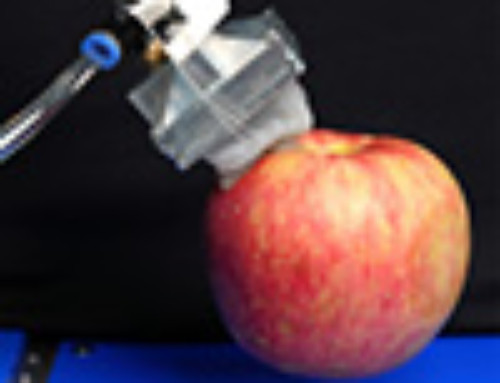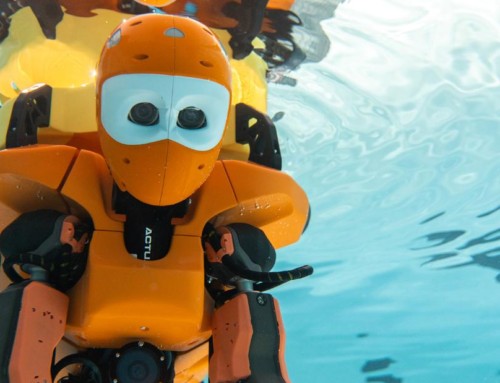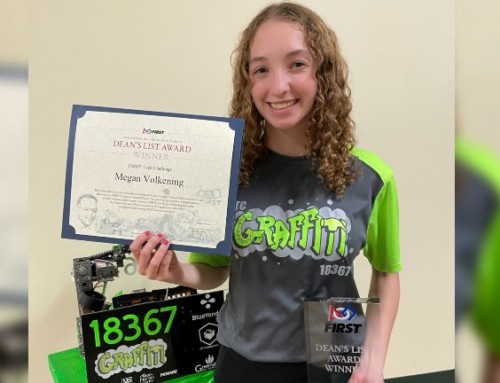[ad_1]
More than a dozen students at North Delta’s Seaquam Secondary are gearing up to compete at the Vex Robotics World Championships later this month.
Three of the school’s seven teams qualified for the tournament, which is being held in Louisville, Kentucky from April 24 to 27, after a strong showing at the provincial championships in early March.
“We weren’t expecting to [qualify so many] at all and we kind of upset the top team at provincials and won,” technology teacher and team coach Bryce Hamade said. “All the teams did really well.”
Hamade said the school’s performance at provincials bodes well for them at worlds.
“When these guys do well at the B.C. provincial championships, it’s not like we go to world championships and just get blown away,” he said. “Every year, the top teams from B.C. place at world championships. So we’re just so happy that we’re able to keep up with some of the other schools, and then we even kind of made a statement with [winning] the design award and ranking second in qualifications.”
This year’s Vex Robotics competition consists of robots shooting balls at flags and placing “caps” on posts to score points. Teams compete two-on-two in two-minute matches that are split into two parts: a 15-second autonomous period, where the robots move themselves using pre-programmed routes and sensors, followed by a minute and forty-five seconds in which a controller is at the helm.followed by a minute-and-forty-five-second driver-controlled period.
 |
| Seaquam robot 9181-Z shoots a ball at a flag as the team fine-tunes their machine in preparation for the Vex Robotics World Championships in Louisville, Kentucky April 24 to 27. (James Smith photo) |
Grade 11 student Rohan Birk has been on the team for three years, and competed at the last two provincials. This will be his first trip to world championships after his group’s robot 9181-Z triple-qualified for the tournament. The robot came in second place of 40 teams in the elimination round, scored second-highest in the skill competition, and won the design award.
“I think we’re feeling pretty good because we did fairly well at provincials and B.C. is one of the better regions when it comes to competitive robotics,” the 16-year-old bot driver said. “Being a top team in B.C. means that you have a good shot at doing well at worlds, so we’re feeling pretty confident coming in.”
As fun as it is building and driving robots, for Birk it’s the team aspect of the program that he finds most rewarding.
“I find the real challenge is being able to communicate with team members. I think the best teams don’t have the most complicated robots, they just have the best teamwork, co-operation, and they just put lots of hours into it. In Vex, the teams that work hard are the teams that will come out on top, so that’s what I really like. You don’t have to have that much experience in robotics, you just need to have creativity to build,” he said.
For Daniel Ruttan, a Grade 11 student and driver/builder for robot 9181-Y, the challenge of building the bots coupled with the thrill of competition is what makes the program so much fun.
 |
| Daniel Ruttan checks the movement of one of the parts of his team’s robot, 9181-Y. (James Smith photo) |
“I was always interested in kind of building things, like I played with Lego a lot as a kid,” Ruttan, 16, said. “I enjoy the competition aspect of it a lot.”
Tournaments in B.C. can range from 40 to 80 teams, with hundreds of kids coming together to compete, he said. “It’s a lot of fun.”
Ruttan’s robot qualified for the world championships after pairing up with Birks’s at provincials for the two-on-two elimination rounds.
“I don’t really know what to expect, it’s pretty exciting,” he said of the upcoming trip to Kentucky. “I think there’s going to be roughly 580 teams there, which is pretty exciting to see that many people from all across the world. I know other teams from B.C. have done really well on the world stage — I know one of the teams from Vancouver Island, 7K, just won the U.S. Open — so it’ll be interesting to see how B.C. is able to represent on that stage, and hopefully have some fun while we’re doing it.”
Ryu Sado is a Grade 9 student in his first year on the team. Sado, who came to North Delta from Tokyo, Japan last summer, is the coder for robot 9181-C. Sado is new to the Vex competition, but participated in First Lego League (FLL) tournaments in Japan. In FLL, kids use the Lego Mindstorm platform to build and program robots to perform tasks and navigate courses completely autonomously.
“It’s pretty fun because we can do whatever I want to the robot, like I can decide how it moves, how fast it moves, how precise it moves. It’s endless, but that’s the good part. I could go into coding forever,” he said.
Sado said his group’s robot was “half lucky” to qualify for worlds.
 |
| Seaquam robot 9181-C shoots a ball at a flag as the team fine-tunes their machine in preparation for the Vex Robotics World Championships in Louisville, Kentucky April 24 to 27. (James Smith photo) |
“I started the coding for the skills [competition] the night before because we were pretty busy on the hardware,” the 15-year-old said. The team’s robot posted “pretty high” on the autonomous part of the contest, and the team’s driver Sam Lee did well on the controlled part. “We posted a 40 and we ranked fourth on skills,” said Sado.
The trip to Louisville will mark another first for Sado, as it will be the 15-year-old’s first visit to the United States.
“I’m very excited, it’s my first time flying to America so it’s going to be a cool experience,” Sado said. “I basically value how fun my life is in any occasion, so I’m trying to have fun in this program and I already do, a lot.”
Coach Hamade, who made the trip to worlds with Seaquam in 2016, said he’s eager to share the experience with the current team.
“I’m excited to take this group of students to world championships because seeing that level of an event put on for this robotics competition — it was televised the last couple of years,” he said. “When you have the 500 teams, with each team having five students and a coaching staff, and all of those teams fill the stadium for the playoffs, and then they have the reveal of what the [next] challenge is and all the students are so excited because they want to see what they’re going to have to build for next year, just the level of energy at the event, it’s really cool to see for engineering and robotics.
“Just the level of energy at the event, it’s really cool to see for engineering and robotics.”
“Like, the closest they might get is maybe a sporting event here,” Hamade continued. “I’ve played sports my whole life but I’ve never competed in a stadium with people watching me like that. So the nervousness and the excitement as they’re controlling their robots, I’m looking forward to seeing how they perform.”
But competing at that level doesn’t come cheap. Registration alone is $2,000 per robot, and Hamade is looking into purchasing special cases to safely ship the robots, each of which cost $200 (not including the shipping and handling to Kentucky). On top of that there are the flights, lodging and food for the 14 students and four adults travelling to the world championships, and all the costs are to be covered by the students’ parents.
“Qualifying half of our teams for world championships was a surprise. We’re up against some of the top schools in the world, and to have that many teams represented from Seaquam, we’re thrilled, but that essentially tripled our cost for the trip,” Hamade said.
To take some of the burden off the parents, the team has started a GoFundMe (gofundme.com/seaquam-robotics-worlds-2019) to help raise funds to cover at least the registration costs for the three robots.
“The families involved would be extremely appreciative if anybody who wanted to support STEM and robotics could visit the GoFundMe,” Hamade said. “Any contributions would be greatly appreciated.”
editor@northdeltareporter.com
Like us on Facebook and follow us on Twitter
[ad_2]
Source link









Leave A Comment
You must be logged in to post a comment.